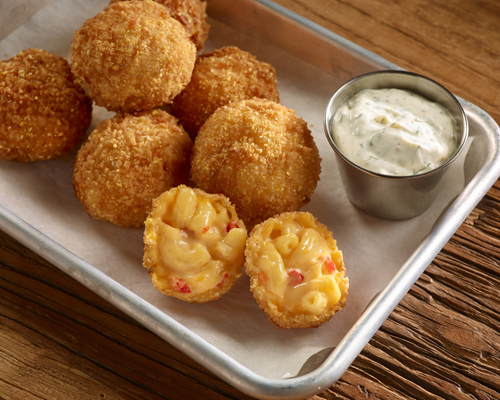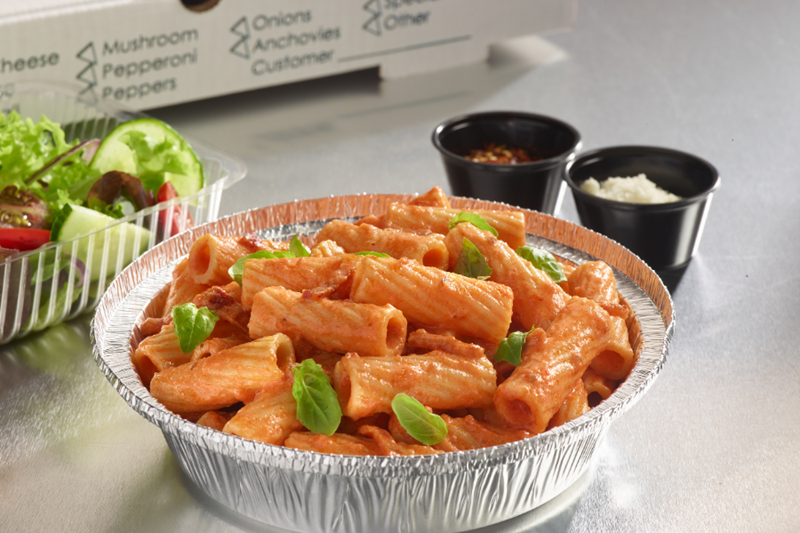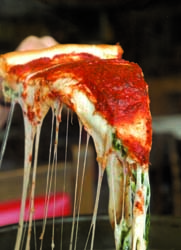 It was a cold, dreary day when Pizza Today visited Nashua, New Hampshire, last spring. Outside, a torrential downpour made the streets slick and dark. But inside two-story Lui Lui, the company’s oversized wood-burning oven took center stage, making the restaurant as warm and inviting as proprietor Eric Roberts himself. Here, comfort food, smiling faces and ample drinks reign, and it seemed to be just the ticket for the diners lining the cozy booths on such a rainy afternoon.
It was a cold, dreary day when Pizza Today visited Nashua, New Hampshire, last spring. Outside, a torrential downpour made the streets slick and dark. But inside two-story Lui Lui, the company’s oversized wood-burning oven took center stage, making the restaurant as warm and inviting as proprietor Eric Roberts himself. Here, comfort food, smiling faces and ample drinks reign, and it seemed to be just the ticket for the diners lining the cozy booths on such a rainy afternoon.

The first Lui Lui opened in 1991 in West Lebanon, New Hampshire, in what seemed to be a doomed location an old mill where several other restaurant attempts had failed. Roberts, along with a couple of partners, saw potential, namely a lack of homemade Italian food in the area. It wasn’t enough to simply offer pizza and pasta atmosphere, they believed, was also key to success. Why pizza? “Everybody loves it,” Roberts says. “You grow up with it. And, it was fun. I went to Italy, I toured around there and had some great pizza. It was just something that I knew and loved, and felt comfortable with. “We hired over a hundred people to open that store, and it’s been a hit ever since.”
Five years later, the second location opened in Nashua (a suburb of Manchester) on a busy highway populated mainly by big chains. “There are very few independent restaurants here,” Roberts says. “It was another risk, another gamble. How were we going to fare among all these big national chains?”

Apparently well. Today, the two-unit concept is slated to earn $6 million in sales.
Central to the restaurants are their wood-burning ovens. The Nashua oven was built by mason Peter Moore in Vermont; the 10-foot, 10-ton behemoth is supported by steel I-beams in the basement. “Every brick is cut by hand,” Roberts says, scrupulously eyeing the flames inside. “The oven is so well-insulated. It’s a showpiece.” (The West Lebanon oven is painted to resemble a tomato and is supported by concrete.) There’s no thermostat and no gas these babies are fueled purely by wood (kiln-dried at $400 a cord), requiring the pizzaioli to learn them inside and out. “The reason we buy kiln-dried is because it is super dried and burns cleanly,” Roberts adds. “When it goes in the oven, it lights right away. This oven will stay hot for three days.” Why are the ovens so crucial to Lui Lui’s atmosphere? “If we were going to do pizza, we wanted to do it as close to authentic as we could, and show people that we meant business,” Roberts explains. “We weren’t going to have an oven in the back kitchen where no one could see. We wanted exhibition cooking to show people the fresh ingredients that we prepare and how clean everything is. We’re sticklers for quality and cleanliness, and we have nothing to hide.”

Cross-training is important to Lui Lui, and Roberts says employees will train as long as needed in an area. Managers at each store “are trained at least a week in every single area, so that every manager can help out if needed,” he adds. In all, Lui Lui employs 150.
And, it takes a small army to pull off Lui Lui’s emphasis on fresh food. Here, bread is made from scratch, as are soups, salad dressings, croutons and sauces. Of course, dough is made in-house daily, as are decadent desserts such as tiramisu, cannoli and Sicilian chocolate mousse. Why not outsource the one menu component most restaurants do? “The quality and, again, being on a strip with all these chain restaurants, we’ve got to differentiate ourselves,” Roberts says. “In the 14 years we’ve been open, there have been over 15 new restaurants that have come into the area. And we’ve still survived. … We feel like we owe it to our customers to give them the best that we can as much as we can make here, in house.”
They use fresh pasta such as ravioli, fettuccine and linguini sourced from a company in Boston as well as some dried varieties imported from Italy. In fact, Roberts and his team go a step further when it comes to sourcing products they actually visit the plants where their products are made. “We build relationships,” Roberts says. “We’re not out there to find the lowest price, no matter who we buy from.”

That keen attention to detail is paying off. They’ve won accolades at the state and local level including “Best of” awards for the restaurants’ Caesar salad and childrens’ menu as a result of their quality control.
Aside from the food is Lui Lui’s drink menu. Sure, there’s beer and wine, but a full bar is available “so we can cater to everyone,” Roberts says. “If someone does not want a beer or a glass of wine, there’s a menu of drinks that they can sort of create with all those different spirits and add-ons. It’s a lot like making pizza. The glass is a canvas for whatever you can come up with. We do bellinis with fresh peach puree. (We use) fresh-squeezed juices and … marinate fruits in rum and vodka.”

Happy Hour (from 2 to 6 p.m. daily) is a big ticket add-on the company sells more than 1,000 $2 margaritas a week.
Popular dishes include the chicken and proscuitto marsala ($12.99), the Caesar Pizza ($10.99 purchased often as an appetizer), the best-selling Marcherita Pizza ($10.99/ $18.99) and the stunning seafood cioppino (shrimp, lobster, clams and mussels in a slightly spicy seafood broth served with fresh linguine for $21.50).
In the last year, an under-$10 menu was added that helped the company’s check average rise. “We lowered prices, and people seemed to order more food,” Roberts says.

Although Lui Lui uses high-end ingredients, Roberts says they are able to keep food costs down by using a computer software program that ties in food costs with their point-of-sale system, a major expense that they initially held off purchasing. “That’s how we’re able to maintain our quality, but we were also able to increase portions because we’re saving money on the other end,” he adds. “We’re able to track it, where before, we were just throwing money away.”
Still, Roberts is also not afraid to spend money on marketing. He’s done radio, television and direct mail, but says that fishbowl e-mail marketing (customers fi ll out a form and drop it into a fish bowl) and having his managers deliver menus to local businesses are cost effective and efficient. “The customers can put a face to it,” he says. “It’s not just something arriving in their mailbox.”

Television was especially effective after the Nashua location suffered a crippling blow following a Christmas Day pipe burst that closed the store for several months (see sidebar on page 77).
For those who have ordered a large carryout order, “We’ll call back and ask how everything was,” Roberts adds. “We encourage managers to visit tables when people come in, and (encourage them to) try things they’ve never had before.” That’s a level of personalization that also sets Lui Lui apart from its big-box chains.
With a steady business already in the Manchester region, could more Lui Lui locations spring up? Roberts says they’ve been approached to franchise, but “our feeling was ‘are we going to lose some of the control?’ ” he says. They hope to grow regionally while promoting from within. Although there are no immediate plans for future locations, Roberts says they’ll strike when the right location hits in the right market. For now, being a technicolor independent in a sea of bland chains feels just right. ?
Ensured by Insurance
Last Christmas, owner Eric Roberts found the Lui Lui Nashua location awash in water after a sprinkler pipe froze and burst. Four to five inches of water ran down the steps and out the front door, and part of the ceiling had collapsed. Both the sprinkler and the lighting systems were ruined.
Within two hours, the company’s insurance company sent a team to start cleaning up the mess. The next day, contractors were on the scene.
“If ever there was an ad for having the right insurance coverage, it’s us,” Roberts says. “For all these business owners who think that premiums are high, we would not have been able to re-open if we didn’t heed the advice of our insurance agent.
“It took two-and-a-half months to put the restaurant back together better than it was in the beginning.”
During that time, they paid all of their employees and managers and the insurance company helped them set up a temporary office especially important for fielding phone calls from customers who had bought holiday gift cards and believed that the restaurant had shut down.
With insurance, they advertised that they would be re-open and were able to bring points of concern up to current code standards. “Any business owner out there, you’ve got to have it,” Roberts advises. “We didn’t plan on this. In our wildest dreams, we never could have imagined something of this magnitude.”
Mandy Wolf Detwiler is managing editor of PIZZA TODAY.



